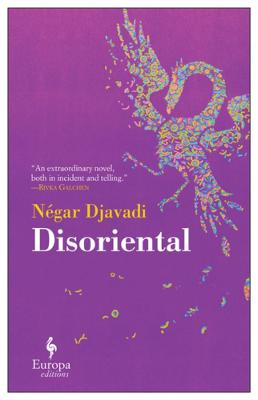Reviewed by Michael @ Knowledge Lost on
What I loved about this novel is the way Négar Djavadi focuses specifically on one person but uses her as the foundation to look at the ancestry of her family. The constant waves of memories and stories are the driving force of Disoriental which allows the reader to explore the cultural history of Iran. From her great-grandfather Montazemolmolk, who had a harem of fifty-two wives, to Kimiâ, a queer woman sitting in a Parisian fertility clinic.
The inner flap refers to this novel as a kaleidoscopic story and I cannot think of a better way to describe Disoriental. We experience many key moments in Iranian history from the perspective of the Sadr family. We look at the cultural changes, the politics and the family throughout. The difference between Kimiâ and her great-grandfather are vastly different. A key element I found fascinating was the treatment of the LGBTQI community. A place where losing your virginity before marriage, having an affair, or abortion, or even a drug addiction is better than being a homosexual. I was surprised to learn that sex changes are legal in Iran, it is better to change your entire gender identity than be same sex attracted.
This whole history makes up the struggle for Kimiâ in the fertility clinic. She is torn between family traditions and her own ‘disorientalisation’ as a modern woman. While this might sound like a bleak novel and in many ways it really is, Négar Djavadi offers so much tenderness to the whole experience as well. We look at the history, we see the family dramas but we also see the triumphs as well. Living in Paris where Kimiâ has more freedom than she may have had in an alternate life. There is so much more to explore within Disoriental but for me this was a novel of identity. Her family’s past defines Kimiâ Sadr as much as her own identity.
I found so much tenderness within such an important book. It was the little moments in their lives that really helped along the way. For example at the beginning of the novel Kimiâ’s father Dirius never took the elevator. He say they were for ‘them’ and by ‘them’ he meant the citizens of France. In this little anecdote we see so much about the attitude he had as an immigrant. Without going into the bleak backstory we know Dirius Sadr sees himself as a second-class citizen not wanting to do anything that might offend the people around him. This small tale says so much without going into specifics. It is this kind of storytelling that allows Négar Djavadi to write about so much about the world without adding to the bleakness.
I am very impressed with Disoriental. I love a novel that can explore important subjects and deal with the current start of the world without making the whole reading experience feel like a chore. I assume that this novel is semi-biographical but I am only speculating. Négar Djavadi has done an amazing job and it is important to have novels like Disoriental in the world. Tina Kover did a wonderful job translating this book which allows me to understand a little more about the world I live in. I highly recommend Disoriental, and it is my pick to win the National Book Award for Translated Literature in 2018.
This review originally appeared on my blog; http://www.knowledgelost.org/book-reviews/genre/literary-fiction/disoriental-by-negar-djavadi/
Reading updates
- Started reading
- 15 October, 2018: Finished reading
- 15 October, 2018: Reviewed
